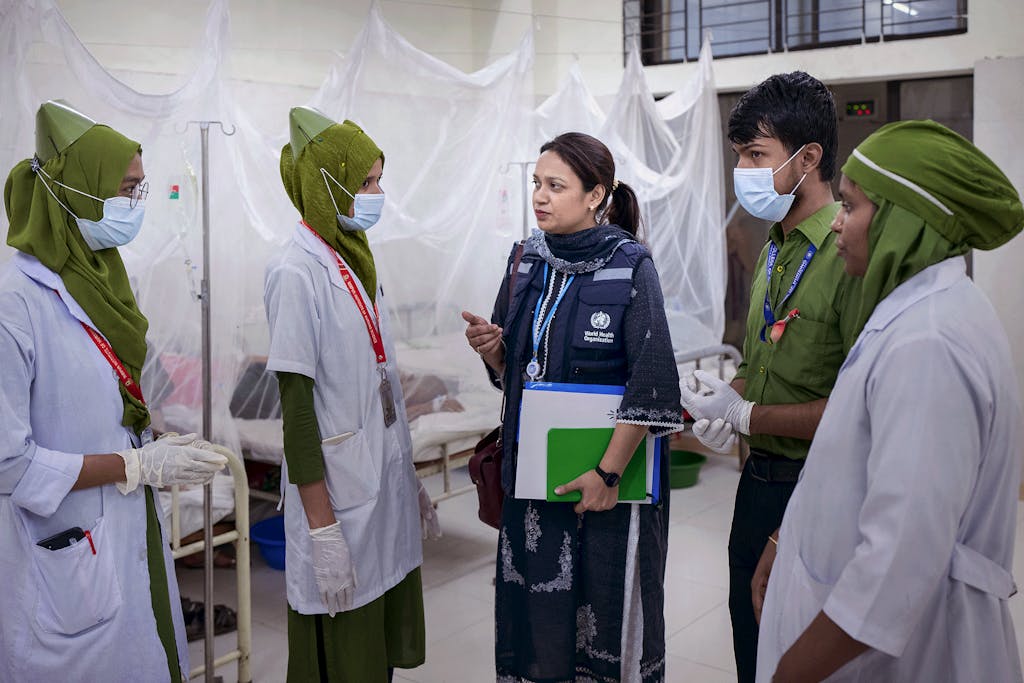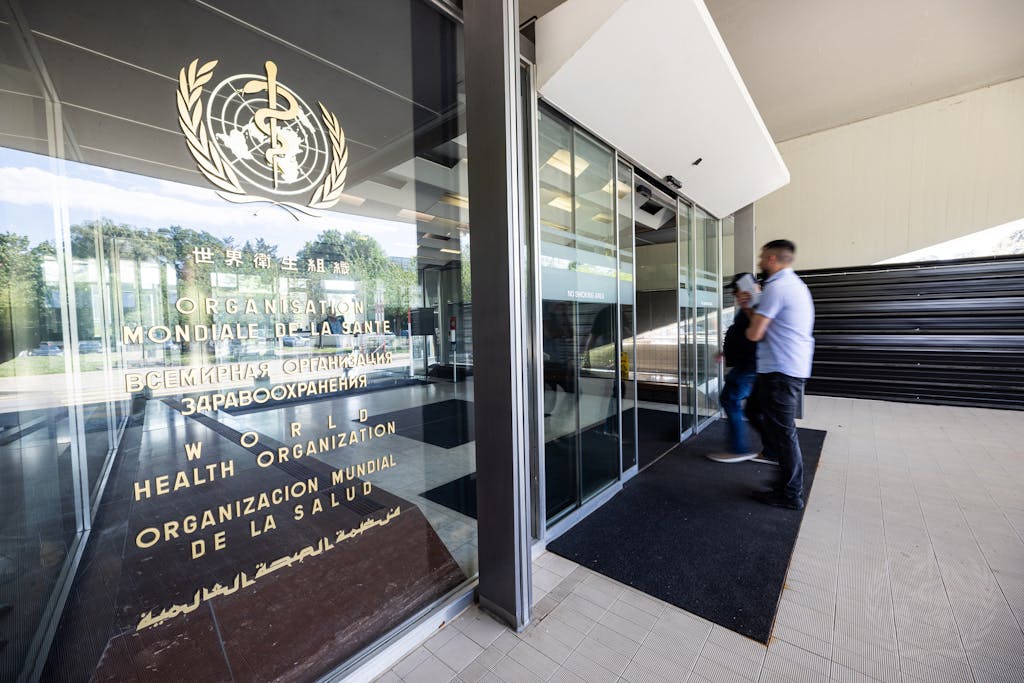Thousands of government officials, global health experts, and advocates from around the world will convene in Geneva for the World Health Assembly to deliberate, negotiate, and decide on the most pressing global health issues. Simply put, it is the preeminent health gathering of the year. With several multiyear negotiations coming to a head at once, this year’s Assembly will put global cooperation to the test.
Between May 27 and June 1, ministers of health and other decision-makers from all 194 Member States of the World Health Organization (WHO) will gather for the 77th World Health Assembly, the annual meeting of the WHO’s decision-making body. A range of global health issues will be discussed at WHA77: defeating polio, malaria, HIV, and other diseases; increasing access to universal health coverage and immunization; countering growing antimicrobial resistance; and ensuring better maternal and reproductive health outcomes. On top of this already-packed agenda, deadlines for negotiations on multiple international agreements are fast approaching, which is ratcheting up the stakes for this year’s Assembly.
All eyes are on Member States that are tasked with reaching legally binding agreements on how they will work together to prevent and better respond to future pandemics. WHO officials will also present plans for its program of work for the next four years and launch a call for countries to fund that work through a new financing mechanism. But while WHO is calling for more reliable and flexible funding, Member States are asking the global body to meet their expectations through new accountability structures. Some of these expectations include greater representation of historically marginalized groups, including women, within the agency. And all of this must be addressed against the backdrop of major crises that are directly affecting people’s health, livelihoods, and survival.

Health workers care for patients infected with COVID-19 at the full emergency room of the Nossa Senhora da Conceiao hospital in Porto Alegre, Rio Grande do Sul State, in southern Brazil amid the novel coronavirus pandemic. Photo: Silvio Avila / AFP / Getty Images
WHA77 Could Revolutionize How the World Responds to Global Health Crises
Topping the WHA77 agenda is the anticipated agreement of the pandemic agreement and amendments to the existing 2005 International Health Regulations (IHR), simultaneous processes with a shared deadline at this year’s Assembly. Negotiations have been underway for over two years, which has proven to not be enough time to fully correct the world’s response to the COVID-19 pandemic.
The pandemic agreement tackles many interventions across the arc of pandemic preparedness, prevention, and response (PPPR), including:
- Mutually agreed terms for transfer of technology and know-how for pandemic products.
- A system for sharing pathogens and genetic sequence data across a WHO-coordinated laboratory network (PABS-S).
- PPPR-related financial assistance provided by a newly established coordination mechanism.
Tumultuous negotiations and extended deadlines have so far precluded these provisions from being ready for adoption at WHA77. While Member States were not able to reach consensus at the levels they intended, a partial pandemic agreement could potentially be achieved before the Assembly. Countries must now decide whether to concentrate efforts around the unresolved issues (i.e., One Health and PABS-S) ahead of this WHA or plan future negotiation processes further down the line. The hope is that a newly agreed course of action will reenergize negotiators to move past previous sticking points rather than allow ambition to gradually wane.
Along with attempts to reach a historic pandemic agreement, Member States have committed to strengthening WHO’s role and capacity in PPPR through targeted amendments to the IHR, currently the preeminent international legal instrument covering measures for preventing the international spread of infectious diseases. These amendments are set to be approved at WHA. In a parallel process to the accord negotiations, countries considered more than 300 proposed amendments to 33 of the IHR’s 66 articles and put forward six new articles. In response to the IHR’s functionality during the COVID-19 pandemic, this package of amendments aims to increase the effectiveness and efficiency of the agency and its members’ collective response to health emergencies. This includes applying clear and distinct definitions to pandemics and public health emergencies of international concern and the respective response efforts these terms elicit, as well as ensuring appropriate financial assistance to implement the regulations.
These two documents, when officially enshrined in international law at WHA77 or later, aim to revolutionize the global response to future health emergencies. Whether or not these new statutes translate to lives saved will be determined by political will and commitments to reinforce WHO as the lead coordinating agency for global health. Given the complex geopolitical landscape and the many thorny issues that confronted negotiators, resolve to bring both processes to the finish line at WHA77 signals countries’ commitment to ensure a better protected and healthier world for all their citizens.

WHO’s Dr Syeda Tasmina Ferdous Jinia speaks to nurses in the dengue ward of Suhrawardy Hospital in Sher-E-Bangla-Nagar, Dhaka. Since April 2023 Bangladesh has been experiencing its most severe outbreak of dengue on record. WHO has helped strengthen surveillance and laboratory capacity, provided supplies, trained doctors, deployed experts, and more. Photo: WHO / Fabeha Monir
WHO’s Strategy for 2025–2028
Several questions must be addressed to form WHO’s strategy for 2025–2028. Among them: How can WHO be more relevant and respond better not only to emergencies (which, rightly, consume a great deal of time, attention, and resources) but also to all the other health issues for which the global body is relied upon? How does the world organize around a strategy Member States can rally behind, agree to implement, and be held accountable to? How does the agency hold itself accountable for what it alone will produce? Our multilateral system is designed to do just that — to help countries and partners work in unison toward common goals. At the same time, WHO should and must be clear about its unique value add and be evaluated accordingly. This has been at the heart of some of the tougher areas of work in developing the agency’s core strategy for 2025–2028, referred to as the 14th General Programme of Work.
Broadly speaking, the goal of GPW14 is “Promoting, Providing, and Protecting Health.” To do this, six strategic objectives are laid out. The objectives are centered around climate change and health; health determinants; primary health care and stronger health systems; health service coverage and financial protection; preparing for risks and emergencies; and detecting and responding to emergencies. The current draft that will be discussed and adopted by Member States at WHA77 also frames accountability around a results framework. The level of specificity of the draft joint outcomes and indicators for the GPW14 has been discussed extensively, and yet, challenges remain. Member States and partners have called for stronger measures and more clarity around shared global outcomes, as well as what WHO alone is responsible for achieving. As such, the results framework has a set of shared outcomes and indicators around the six objectives, with a separate section on corporate outcomes that shows what the agency will be held accountable for delivering.
A lesser known, yet consequential, issue that will be addressed at WHA77 is the legacy of WHO processes around its system of biennial budgets. The GPW is a framework over a four-year period that provides the general direction of travel, while the program budgets lay out the more detailed costings and objectives the agency aims to achieve. As such, the level of specificity around the draft outcomes and indicators is negotiated through the program budgets. At WHA77, Member States will actively engage in discussions around this, with the aim of having more specific targets for the 2026–2027 Programme Budget by November, to inform discussions around the upcoming Investment Round, which will provide financing for the GPW.

The entrance to WHO Headquarters in Geneva, Switzerland. Government officials, global health experts, and advocates from around the world will gather in Geneva for the 77th World Health Assembly. Photo: WHO / Pierre Albouy
WHO Funding: Reforming a Broken Financing Structure
WHO has dealt with insufficient and unpredictable funding for most of its 75-plus-year history. As expectations for the agency rose during the COVID-19 pandemic, it became painfully clear that urgent action was needed to address the funding issue to ensure that WHO could meet the world’s demands. In 2021, a Member State working group recommended a series of funding improvements.
The first of these improvements involved increasing Member State dues, called accessed contributions, which previously accounted for less than 20% of WHO’s funding. At last year’s Assembly, Member States stayed true to their word by implementing the first increase to assessed contributions for the biennial program budget for 2024–2025. The volume of fully flexible assessed contributions is set to gradually increase to 50% of WHO’s 2022–23 biennium base budget by 2030–2031.
However, that means that at least half of WHO’s budget will continue to rely on voluntary contributions from Member States and other donors. Dependency on voluntary contributions brings several limitations. Most voluntary contributions are tightly earmarked to specific programmatic areas or geographical locations based on donors’ interests, limiting WHO’s ability to efficiently allocate resources across its programs. Furthermore, because voluntary contributions are often provided on only an annual or biannual basis, it is difficult for WHO to plan for the entire four-year period of its GPW.
In order to increase the predictability of voluntary contributions and ensure all areas of GPW14 are covered, WHO is spearheading a new financing mechanism, known as the WHO Investment Round, which will launch at WHA77. In the lead-up to the launch, WHO Director-General Dr. Tedros Adhanom Ghebreyesus has provided a progress report. WHO is not looking to increase voluntary contributions, but rather to receive donor commitments earlier and with fewer restrictions. The Assembly is a crucial moment for WHO to build momentum and support for this new financing modality before donors are expected to make their commitments during the high-level Investment Round event in November. At a budget meeting earlier this year, Dr. Tedros assured countries that “We well understand that in return for more predictable and flexible funding, Member States expect improvements in efficiency, effectiveness, and ultimately, in the results we deliver — that’s accountability.”
Holding WHO Accountable
Discussions at WHA77 will center on ensuring the global health agency is fit for purpose to meet the evolving demands of the global population. As WHO’s responsibilities grow, changes to the institution’s structure and practices will be needed to improve equitable representation, transparency, and accountability. At WHO and in other multilateral settings, spaces for civil society are shrinking; questions loom over the rights and privileges of observers; and gender equality remains a divisive issue, specifically when it comes to guaranteeing sexual and reproductive rights. The world has called upon the agency to walk the talk, through the inclusion of voices from all sectors and backgrounds in decision-making processes, by modeling gender parity in its offices’ work, and by overcoming political barriers to protect the health of everyone, including women and girls.
Finally, it will not be lost upon anyone that this year’s Assembly takes place against the backdrop of unimaginable humanitarian and health catastrophes across the world. Thus, decisions at WHA77 must address the urgent health needs of those in conflict-afflicted and vulnerable populations while developing operative plans for WHO to promote health as a pathway to peace.
Although the Assembly is not immune to wider geopolitical challenges, WHO continues to safeguard its reputation as a fierce proponent of multilateralism through what the agency has coined the “spirit of Geneva.” Confronted by both internal and external pressures, WHA77 is an opportunity for the leading global health agency and its supporters to come together to chart a more resilient and agile path forward, so the world can count on WHO to deliver on the promise of “health for all.”
Get The Latest on WHA77
For more information on side events and expert analysis, visit our hub for the 77th World Health Assembly.







